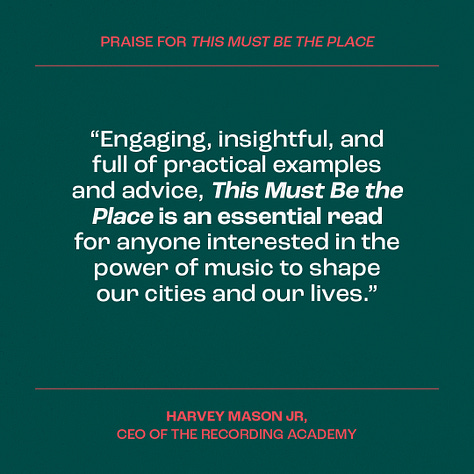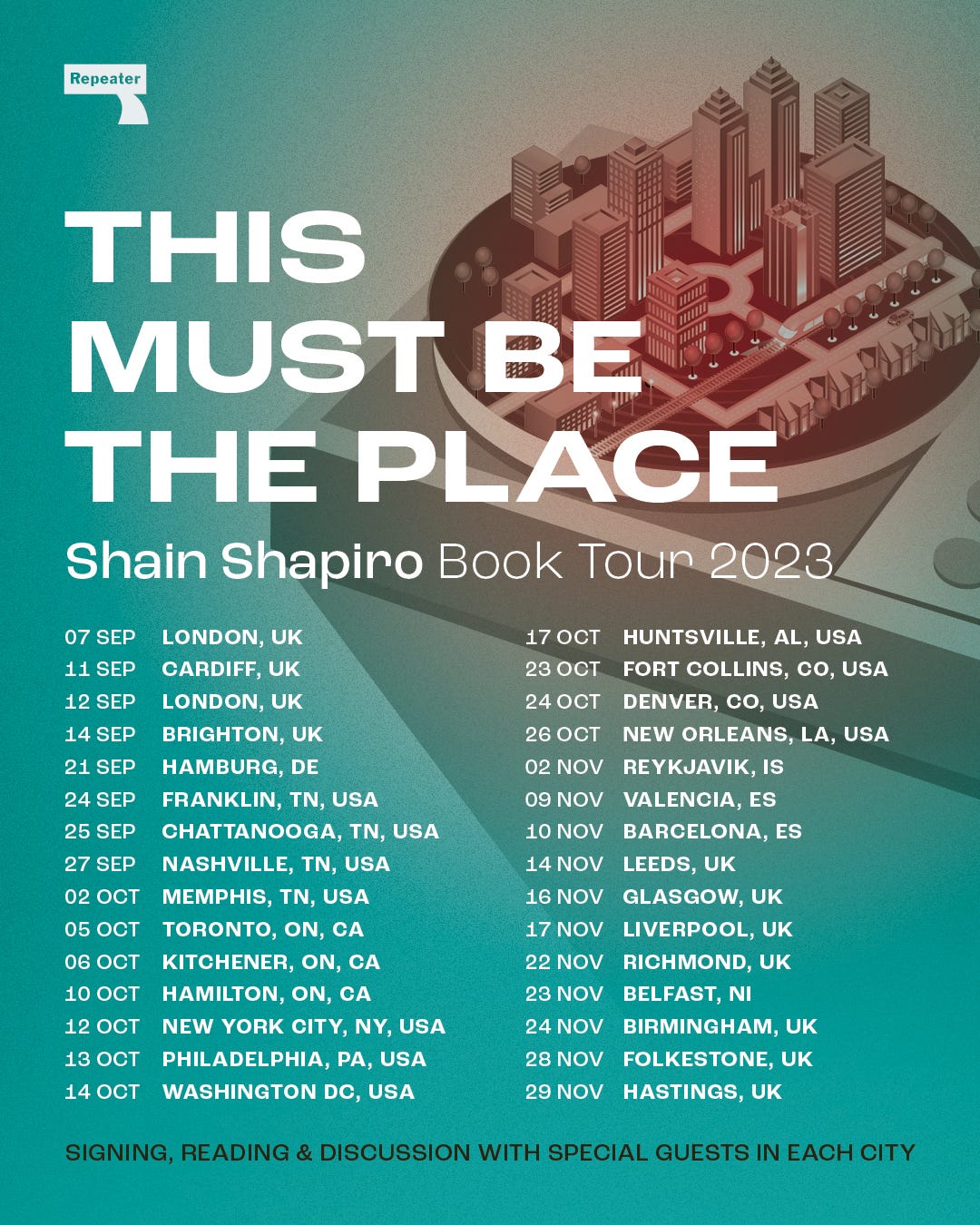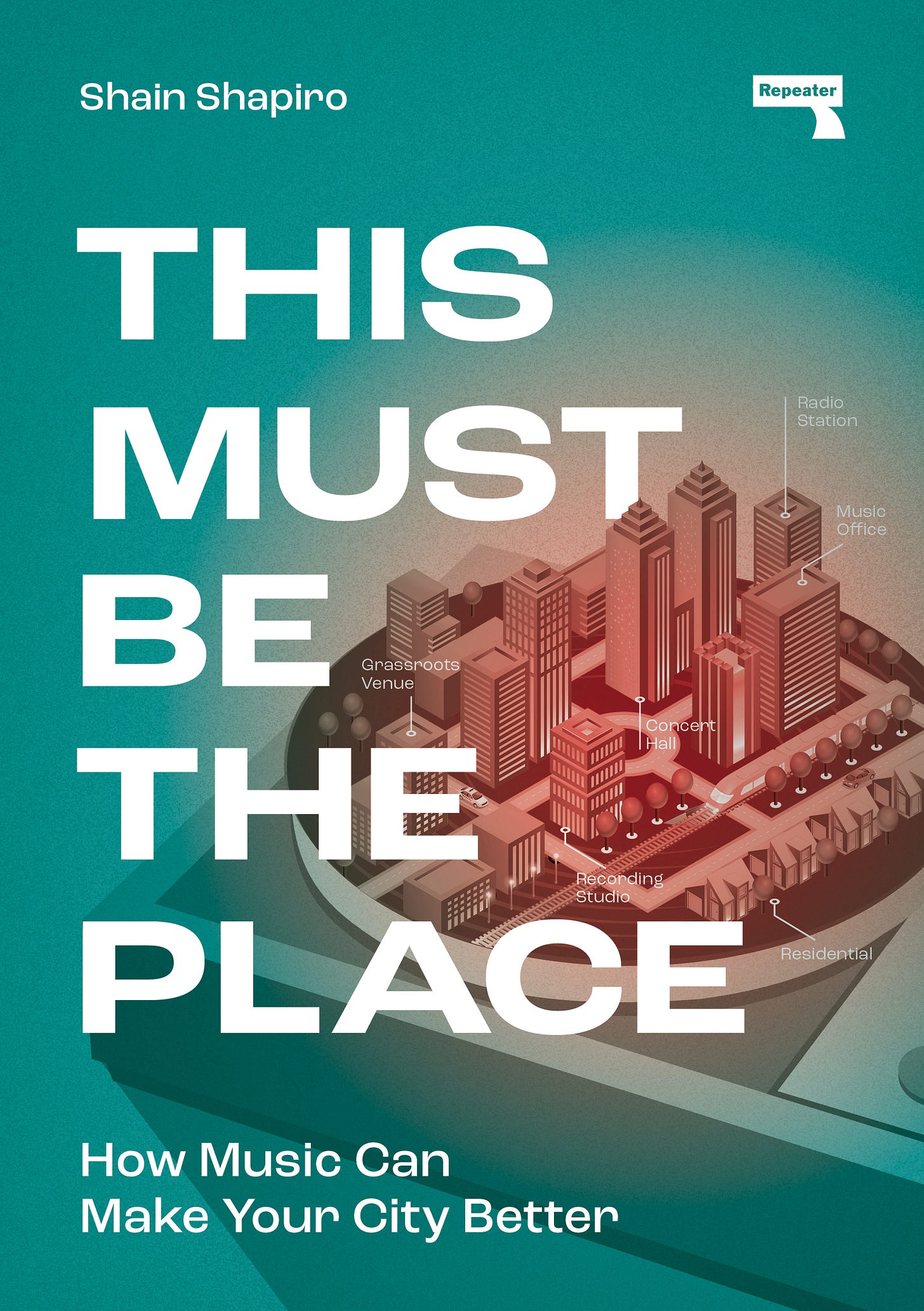Lessons Learned - 10 Years of Music, Cities & Travel - A Personal Post
My book is coming out next week. I'm in a reflective mood.
In 8 days - on Tuesday, September 12 - my debut book, This Must Be The Place: How Music Can Make Your City Better, will be released. This Thursday I will be embarking on a 30-date book tour to celebrate across North America, Europe & the UK. Have a look at some of the endorsements below, as well as the tour poster.
Last week, one of my subscribers asked me to write a personal post exploring what I have learned in ten years of music, travel, cities & politics. So here goes. Later this week or early next, I will continue the series of global music policies, but for now, and for the first time ever, here are some thoughts both looking back and looking forward.









Here are some thoughts I hope that share some insight as to how I approach work - and how it impacts me.
First - Never Assume. Assumptions Foster Prejudice
I have learned this time and time again and while it may seem like common sense, I have learned that it is not that common. Every place is complex when it comes to music and culture. All genres exist everywhere. Just because there is no economic policy written to support music doesn’t mean there isn’t a desire to do so. Local politics are inherently complex and the answer to why something is or isn’t happening may not be straightforward, and not doing something doesn’t mean it is a conscious decision to do so. We all make decisions emotionally when it comes to music, as we tend to focus on what we like. This can foster assumptions. I have learned, over 10+ years and visiting 50+ countries, to try to be aware of them and remove them as much as possible.
Next - Most People Do Not Understand How Literally Music Works. And That’s OK
I use the word literally, literally. This happens in all sectors. Very few of us know how a plane works yet we all still get on them. Few of us know the intricacies of a car engine but we all entrust the finished product every time we turn on the engine. We all entrust drugs despite little understanding of how they are made and what’s in them. I believe the same cognitive dissonance happens when we’re listening to a song or at a concert. Few folks who love music have ever set foot in a studio and music, like a plane, is something that most folks take at face value as a finished product rather than a collection of parts engineered into a whole. And this lack of understanding is OK, because (see next point)…
Addressing This Lack Of Understanding Is An Incredible Opportunity
Over the years at Sound Diplomacy, my team and I have written a number of guides and reports that have tried to explain how music works and why it matters - as a business and as part of our collective lives. Often a lack of understanding of how music works - or a perception that may not be entirely correct - is a breeding ground for frustration. Musicians believe their value is ignored, which leads to music being trapped in a victim narrative (so it must be saved, and artists are always taken advantage of). Or, as I am trying to articulate at the Center for Music Ecosystems, music is often ignored as a tool to address global challenges, because how it's made, the value it has, and how it works are often misunderstood or not known. I’ve found that this is more due to an ‘I never thought of it that way’ problem rather than an 'I choose to ignore it’ problem. It is this explanation that I work on every day. I’m trying to do it now. And I realize it is something I will always be working to improve.
Side note - Come see me on tour (dates below)
Back to the lessons….
Every Place - For The Most Part - Has The Same Unique Problems (for the most part)
I have worked in over 100 cities around the world. I travel around the world via Zoom every week. This month I was in Australia, the Philippines, and Trinidad & Tobago, for example. This is what inspired me to write the book. Challenges are individual but what holds a lot of cities and places back are consistent across borders, cultures, and jurisdictions. I have heard versions of the same problems everywhere. That does not discount their validity or impact, but it does foster perspective. If we all had this perspective, we would realize making things better is in our collective interest.
When It Comes To Making Music Policies Impactful, The More You Know About Your Neighbors, The Better
In most communities we’ve worked, most share friendly rivalries with other communities, be it one down the road or one of a similar population size or industry base. Whether it is a city developing a music or cultural policy or a developer working on a mixed-use entertainment complex, the more data one has about their neighbors - be it literal or comparative cities and places - the better the policy and the simpler it is to offer solutions that people can see or feel - such as increased investment, new infrastructure or official representation. The more we know about - and care about - our neighbors, I’ve learned, the better the outcomes.
Like Assumptions, Implicit Biases Are EVERYWHERE. Dealing With Them Are Tricky and Necessary
I find it embarrassing that in many cities and places around the world, funding for music is specific to certain genres or singular venues or festivals. In 2023. We still make decisions based on what we know and see the unfamiliar as, well, unfamiliar. Everywhere I’ve worked there are implicit biases - often not intentional, but still implicit - which lead to bad decisions that make things worse. Building a world-class concert hall is all well and good, but if that’s the only thing the community does, it will widen income and cultural inequality. The best path to addressing this, I’ve found, is to assemble data and present a different cost-benefit analysis that spreads investment. But this is slow and politics is fast. If anyone has figured out a way to address this, I’m all ears.
And lastly…
The Best Way To Lead Is To Entrust The Future to Others
I became Chair of Sound Diplomacy in February. This means I have less to do with its day-to-day activities. Instead, the firm is led by a group of incredible, driven professionals around the world who are taking it in directions I never thought possible. This I am proud of - not what I’ve done, but what others are doing now. The less control I have over what happens, so long as those in charge understand the core mission - the better. This has given me more time to do this, write the book, launch a nonprofit and I hope, work on global policy challenges. Which, I hope, is how everyone wins.
What do you think? Let me know in the comments. And do buy the book here:




